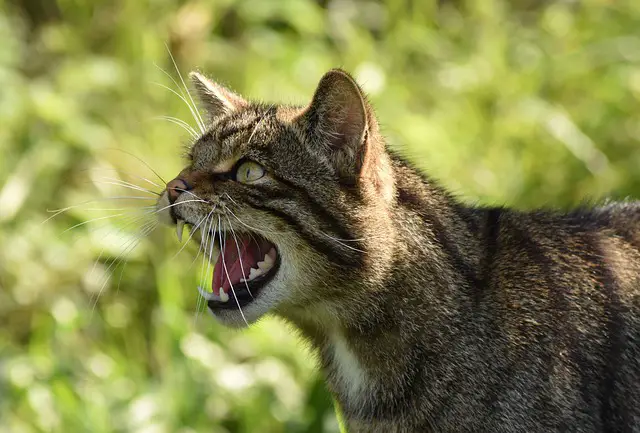Cats growl when they play because, for cats, play simulates hunting behavior. As long as your cat isn’t showing any other signs of being upset or hurt, growling is a normal part of the play.
There are few pets more enigmatic than cats. Their behaviors can be hard to interpret, and this includes the various noises they make when playing. Some cats are silent, some meow, and some even growl when they’re playing with us, their toys, and even other cats.
You may be wondering, ‘Why does my cat growl when playing?’. This growling behavior stems from the play that all kittens engage in with their littermates. As kittens, playing is meant as an early tool to teach kittens how to hunt once they reach adulthood, and like adult cats, kittens will practice their growls while playing.
Some kitties just never grow out of the growling habit during playtime, but for some owners, hearing their grown cat growling at them can be disconcerting. Let’s examine why some cats growl during an otherwise fun activity.
Is It Normal for Cats to Growl While Playing?
It’s normal for cats to growl while playing, but not all of them will. Whether a cat growls while playing will differ from cat to cat.
Like people, cats have unique personalities, and they all behave differently. These differences can be all the more apparent when you go to play with your cats and one of them growls while the other stays silent.
There’s no reason to worry if your cat growls while playing because it’s totally normal. Cats spent much of their time as a kitten play fighting and growling with their littermates to become better hunters, and this behavior often continues into adulthood.
The important thing when playing with a growling cat is to know the difference between a playful growl and a more serious one. Your cat’s body language is a great indicator of how your cat is feeling, so if you think your cat might be angry or afraid instead of playful, look for these signs:
- Puffed tail and hair along the spine sticking up
- Ears laid flat against the head
- Tail swishing rapidly from side to side
- Hissing or spitting
It may take some time to become familiar with a new cat’s moods and body language, so start with gentle, low energy play before ramping up to more high energy play that may include growling.
What Does a Low Growl From a Cat Mean?
In most cases, a low growl from a cat means they are angry, guarding something, stressed, or fearful.
Some cats growl when playing, but a low, rumbling growl outside of playtime almost always means that your cat is in some sort of distress. A cat may let out this growl when guarding food against other cats, or when they are feeling threatened by another cat or some other sort of animal. Growls are a cat warning sign.
Once a cat is to the point that they are growling, hissing, or spitting, it’s recommended to leave them alone and let them calm down. Continuing to interact with an angry or fearful cat can lead to them swiping at you with their claws, which is something no owner wants.
Why Does My Cat Get Angry When Playing?
It’s easy to confuse angry growling with playful growling, but there are things that can happen during playtime to switch your cat’s mood from playful to upset. This happens more often when cats are playing together, rather than the owner playing with the cats.
Some cats, especially younger cats and kittens, may push the boundaries of their playmate too far while playing, making them angry. A cat will become angry when playing because its playmate has crossed the line and is playing too roughly.
Cats will playfully growl when tussling with each other, but if things progress to an actual fight, separate your cats and let them calm down for a bit. As long as no one got seriously hurt during the fight, your cats should be quick to forgive and forget.
Why Does My Cat Growl When Playing With a Toy?
Play between baby animals, especially predators like cats and dogs, is used almost exclusively as a practice for hunting. Even if the kitten is destined to be an indoor cat their whole life, this early life play is an important skill for all baby cats to learn.
A cat will growl when playing with a toy because, in the cat’s mind, the toy is its prey.
For indoor cats, toys like fake mice will take the place of the real animals they would hunt in the wild. Since these toys are as close as an indoor cat will ever get to hunting, they will often growl when playing with these toys.
Cats Growling When Playing With Other Cat
Like other vocalizations, growling is a way for cats to communicate with one another while they play.
It’s normal for cats to growl while playing, even as adults, and it’s an easy way for the cats to tell each other if they are still just playing or if they are becoming angry and a fight is brewing. Cats utilize many vocalizations and other types of communication, like body language, to make their feelings known.
Final Thoughts
A cat’s growl can sound frightening, but sometimes they growl during play because they are enjoying themselves. As long as the growling doesn’t progress into hissing or spitting, then it’s a totally normal part of kitty playtime.
[su_box title=”Affiliate Disclosure”]This website is supported by its readers. Please assume that all links are affiliate links. If you make a purchase from one of the links we will make a commission from Amazon. Thank you.[/su_box]




